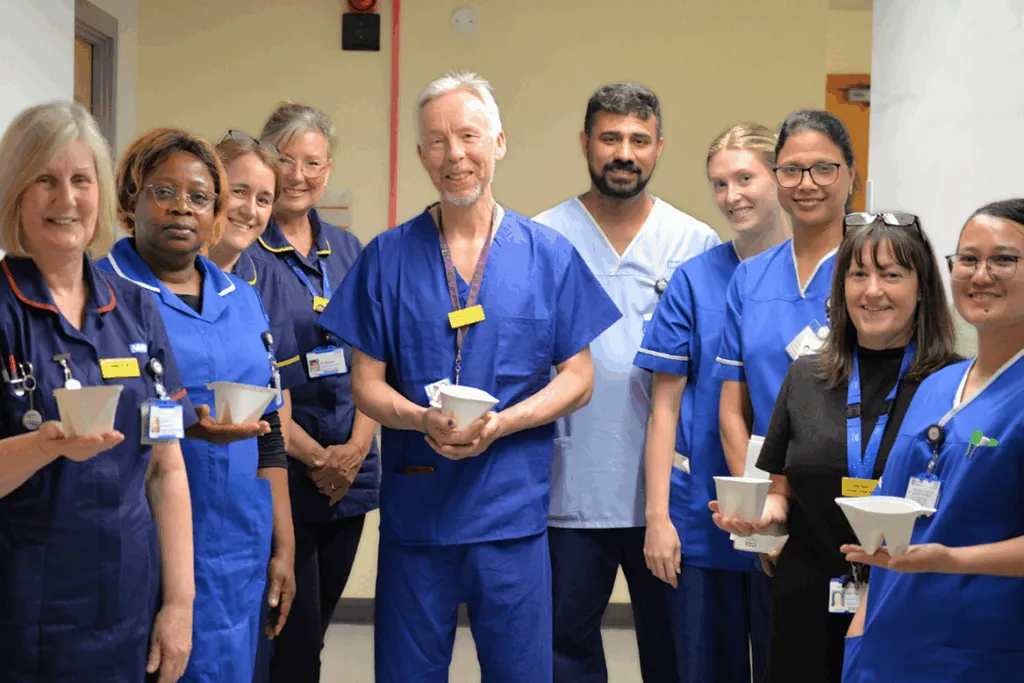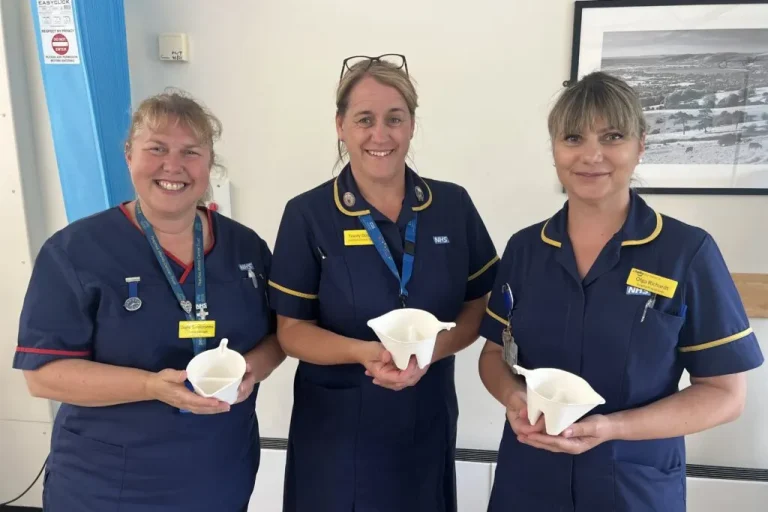Nurses in the South West of England have been instrumental in trialling and championing a new eco-friendly urine sample collection device, helping to reduce plastic waste and improve patient dignity.
The Pee-in-Pot (PiP) is made from bamboo and sugar cane and eliminates four items from the traditional urine collection process, three of them plastic – making a minimum carbon saving of 78%.
“From an infection control perspective, it’s been really exciting to be part of something that isn’t the norm”
Tracey Doolan
Invented by consultant urologist at Somerset NHS Foundation Trust, Nick Burns-Cox, the device’s rollout has been driven by nurses across the organisation who have led its testing and implementation.
Previously, to collect a midstream urine sample, patients would be asked to urinate into a sterile bowl. The sample would then be syringed into a 30ml tube, sent to the lab and pipetted into a 10ml plastic tube for analysis.
Mr Burns-Cox concluded that this process wasted clinical time as well as materials, and increased the risk of human error through repeated handling.
The PiP has simplified this entire procedure, through built-in sections that allow staff to tip out excess urine, leaving the precise 10ml needed for analysis. This sample can then be easily transferred into the boric acid tube through a special funnel.
PiPs are maceratable, meaning they can be safely flushed away after use, making them seven times more environmentally friendly than plastic sterile bowls which are incinerated.
The trust estimates that reducing plastic incineration will save around £300 for every 21,000 sterile bowls previously used – roughly the number used per year for every 1,000 inpatient beds.
Across the NHS, this translates to a carbon saving of three tonnes per year – equivalent to the annual electricity usage of six homes.
Infection prevention and control nurses have been key to PiP’s success, leading a study to determine whether using the device for clean urine collection was as safe as the traditional sterile method.
The study, involving 1,353 paired urine samples collected at the trust’s Musgrove Park Hospital, found no significant difference in positive or negative culture rates.
Tracey Doolan, a senior infection prevention and control nurse at the trust, has worked with Mr Burns-Cox for 20 years and has been a key champion of the PiP, from the initial trial to its wider rollout.
She told Nursing Times that infection control teams were often seen “as a barrier to sustainability projects”, despite their willingness to support environmental initiatives.
Reflecting on the rollout, Ms Doolan said: “I think anything new in the NHS can be challenging to roll out, because we’re all so busy.
“We’ve all got lots going on, but with this… it has been very easy to rollout,” said Ms Doolan. “In fact, I had colleagues on wards emailing me or phoning the office [saying] ‘when are you coming to our ward?’”
She added: “We wanted to make sure that we got it right, steady and slowly. But actually it took off really quickly which is great.”
The success of Mr Burns-Cox’s innovation hinges on involving the multidisciplinary team from the start, Ms Doolan argued, including nurses on the “shop floor” who would be using the device.

Nick Burns-Cox (centre) and his team holding the Pee in Pot device
She said: “The key is involving the right people, and that is absolutely what this organisation and the PiP team have done to get the right people on board from the start.
“From an infection control perspective, it’s been really exciting to be part of something that isn’t the norm.
“I think there’ll be lots more challenge in the future with sustainability standards,” she said.
“And there will be some things we can’t pass off the safe, but those things that we can evidence that are safe [are] really exciting.”
Meanwhile, Olga Richardt, a surgical practitioner who helped run the PiP trial in the trust’s emergency surgical unit, described how previously the waste in surgery was “way too high”.
“We have lots of plastics, and our bins, physically you can see they are full,” she told Nursing Times.
Ms Richardt noted that, while there was “a level of scepticism initially”, the determination to reduce waste led to an effective rollout.
“We [wanted] to find out where it leads because we do want less waste and we want to contribute to the future of patients beyond the hospital wards. We want a better environment,” she said.
Importantly, she argued that the project had given nurses the confidence to challenge established practices.
She added: “I think the challenging itself, the challenging of an idea, it is encouraging for nurses because it gives us the opportunity to question other aspects in our clinical area as well.
“So it gives you this environment [and] space for you to question a clinical practice.”
Diane Smallacombe, clinical manager of the day surgery ward at Musgrove Park Hospital, said she was eager to be involved after hearing about the project at a clinical managers’ away day.
She said: “Nick attended a clinical manager away day and he shared with the band 7s and 8s who were there about the project.
“Because I know him and work very closely with him and his colleagues, I was very keen to just be involved.”
She added: “We wanted to give extra, because we knew that this person had developed this new way of working.
“So the fact that we’ve been able to challenge and prove that actually there are different ways of working, it’s been really lovely to be part of.”
Since the trial, PiP has been rolled out across both of Somerset’s acute hospitals – Musgrove Park Hospital and Yeovil District Hospital – as well as its community hospitals.
It is also now available nationwide through NHS Supply Chain, offering an opportunity for nurses across the country to lead sustainable improvements in patient care.

